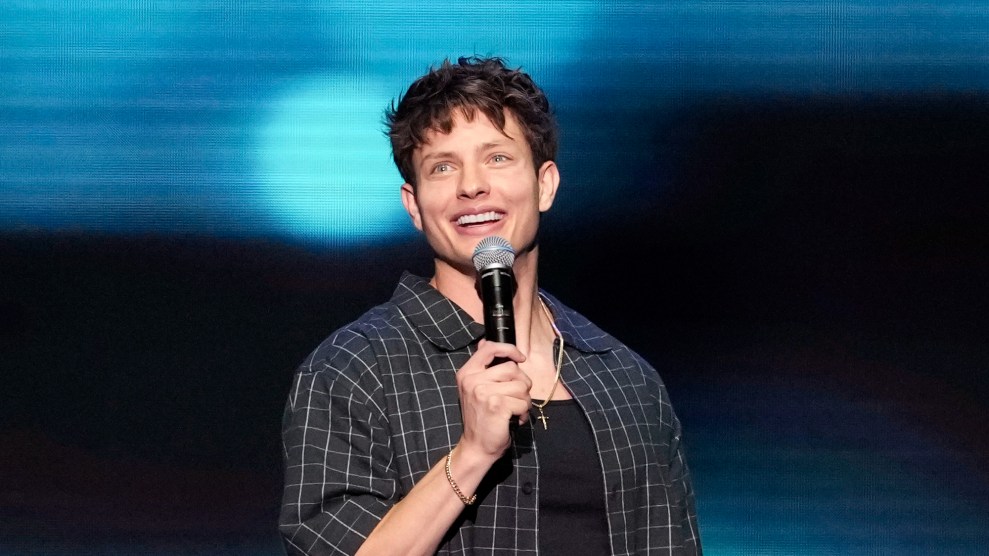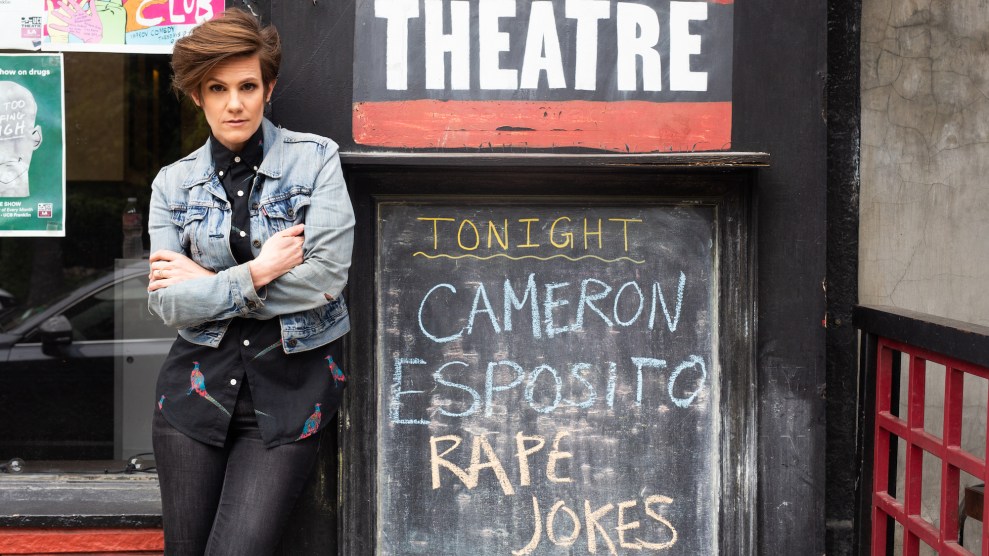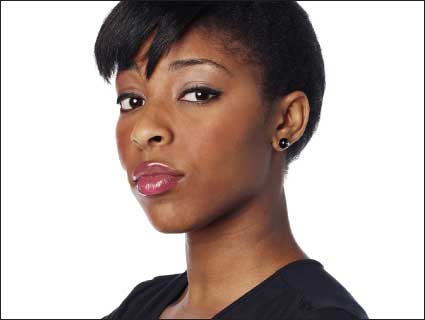
Charles Sykes/AP
Matt Rife ends his new comedy special, Natural Selection, with a literal mic drop. It’s a bold move considering the special, released on Netflix November 15, garnered almost immediate criticism for being misogynistic, ableist, racist, and generally unfunny.
Rife, 28, began doing standup in his teens, eventually finding success on the hip-hop comedy improv show Wild ’N Out and playing small parts on shows like Brooklyn Nine-Nine and Fresh Off the Boat. But he didn’t became famous until 2022, when TikToks of his crowd work at standup shows went viral. In his breakout TikTok, Rife chats with an audience member who recently broke up with her ER-worker boyfriend because she said he was lazy when he came home from work. “He was saving lives!” Rife exclaims, the crowd cackling. These clips (along with Rife’s chiseled jawline) earned him a large following among women, despite the fact that much of his material is tinged with chauvinism. During an appearance on The Tonight Show to promote the tour, Rife played the starry-eyed ingenue, baffled by his own success. “My entire life has changed in a matter of 14 months,” he said. “I’m so grateful.” Rife amassed more than 18 million followers on TikTok; demand for his 2023 world tour ProbleMATTic was so high it caused Ticketmaster to glitch.
The veneer of affability drops within the first three minutes of Rife’s special. In a much-discussed opening joke, he mocks a restaurant hostess with a black eye, suggesting that if she could cook, she wouldn’t have faced domestic violence. Rife never apologized for the joke, instead responding to his critics by directing them to a link to a website that sells helmets to protect disabled people who have frequent seizures or head banging. The special is full of ableist humor too, including a bit about an autistic boy’s private parts.
In an interview with Variety, Rife noted that the special was “way more for guys” than for women. And last week, he appeared on a podcast with Canadian psychologist and conservative provocateur Jordan Peterson, where the two expressed their mutual admiration. Peterson, one of the most well known figures in the internet “manosphere,” framed Rife as a victim of cancel culture, suggesting that he’d been unfairly maligned by social justice warriors who couldn’t take a joke. Other right-wing media quickly took up his cause, with The Daily Wire‘s Brett Cooper and Steven Crowder’s Louder With Crowder jumping in to praise Rife’s refusal to apologize. Rife’s appearance on Peterson’s podcast hints that he’s embracing this right-wing narrative that positions him as a warrior for free speech and political incorrectness.
Naturally, the staff at Mother Jones felt an obligation to weigh in on this mess, and after watching, gathered for a much needed debrief. Our conversation has been edited for length and clarity.
What was your initial reaction to the special?
Katie Herchenroeder, Editorial Fellow: My initial reaction to watching the special was kind of twofold. On one end I felt angry and upset, a bit sad, and on the other end I felt bored and was checking the clock and just kind of disappointed in the skill of the comedy.
Sophie Hayssen, Editorial Fellow: I was more surprised by how basic the special was. I felt like I was watching a comic from at least 30 years ago with all the topics that he covered and the way he covered them.
Arianna Coghill, Assistant News and Engagement Writer: My reaction was initially very similar. The comedy was so uninspired I couldn’t even be offended. I’ve heard the same things in seventh grade on the back of a bus. But there were certain moments that did make me outraged. It was got to the point where I was like, “Wow that’s a really really messed up thing to promote to your audience.”
What has stood out to you about the internet’s response to this?
KH: My initial introduction to the special really focused on that first joke that he made about domestic violence—that was how I heard about it. And initially I thought, oh, he made this one really horrible quote-unquote “joke.” But what stood out to me when I watched it was that [this kind of thing] was just constant.
SH: Yeah, I would say similarly, I think the internet is focusing on the domestic violence joke. It’s good that people are latching on to that and discussing it. I think the ableist section of the special is what no one has been talking about, but that seems equally egregious to me.
AC: 110 percent agree on the ableism front. That was the part of the special that hit me to my core and made me feel disgusted.
SH: When he gets flack for saying all this stuff about women and domestic violence and disabled people and doing a blaccent, he’s like, why is social media so toxic? But [in the special], he jokes about a fat woman hanging herself. You don’t think that maybe you are the problem?
What about this special indicates that Rife is moving beyond just being a contrarian comedian, and really parroting the kinds of right-wing talking points that you see in the manosphere?
KH: He talks about how he’s just trying to get laughs and how people are too sensitive. We have seen time and time again that this messaging is incredibly effective to young men who are trying to figure out where they are in the political spectrum and finding a sense of community. I think that that’s why it makes it effective. It’s because they are searching for something, and it’s just unfortunate that they’re met with this false sense of community that’s really just centered around misogyny. I wish there was a better space for these people to go that wasn’t a Matt Rife fan account.
SH: I think his status as not being explicitly part of the manosphere makes him a lot more dangerous as a person. I think a lot of people on the left feel this way, but if I hear Ben Shapiro talking about something, I do not trust anything that guy says. But I think that with Matt Rife, when women for whatever reason feel comfortable with him, then it becomes a much different ball game in terms of who he can reach.
AC: I was talking with a friend the other day about another friend of ours who recently fell into the manosphere. It never starts out with the most extreme stuff. It’s usually the stuff that’s more on the moderate side. When people get introduced to Jordan Peterson, if they see his extreme stuff first, they’ll keep scrolling, but if it’s just, “clean your room, brush your teeth, and maybe a girl will talk to you,” that seems more reasonable. It allows people to explore even further and opens their mind up further to that kind of bigotry.
KH: In the Jordan Peterson interview one thing he says is that he told the domestic violence joke at the beginning because he wanted to communicate to the audience what type of special this was going to be and what type of comedy he would be doing. He tells Peterson that if people saw that joke and they didn’t like it then they can just turn off the TV. Whenever I heard that I was just thinking, okay, so who’s going to keep watching after seeing that? It’s going to be the people who are like, “That was in bad taste. But let’s see what else he’s got.”
After Rife delivers the domestic violence joke, he jokes about wanting to see whether the audience is “fun” or not. What does this framing accomplish?
AC: It adds this social pressure, because nobody doesn’t want to be considered fun. There are a lot of people who want to be perceived as cool and not taking themselves too seriously because, to be honest, being involved in social justice was for the longest time framed as a very uncool, very dorky, and very serious thing. Nobody wants to be a killjoy.
KH: I think that him saying “Are you guys going to be fun today?” feeds into the online spaces where the manosphere is and this discourse exists. It’s who can say the most provocative thing in this space right now and who’s going to get offended. Mapping that onto who is the most “fun” works well in online spaces where being the devil’s advocate is really rewarded.
SH: It’s asking people to not think more deeply about his comedy, to keep everything shallow. That’s a huge danger of cancel culture panic—this idea that words are just words and don’t have any repercussions. Part of what Matt Rife’s defense on the Jordan Peterson podcast was, essentially, “if you don’t like it just ignore it.” He made the comparison of “I don’t like heavy metal music, so I just don’t think about it.” The domestic violence joke would be bad even if it were about a completely made-up person, but it’s about an actual woman. We don’t know how she got her black eye, but if she did get it from domestic violence and she sees this special, how’s that going to make her feel? How’s that going to make all victims of domestic violence when they see someone joking that if they had just been a better cook then their partner wouldn’t have beaten them? You see you see the same thing with comedians like Dave Chappelle, one of Matt Rife’s heroes, in his comedy about trans people.
Rife has been criticized for his use of a blaccent in the special. What did you make of that?
AC: On an episode of Wild ’N Out, he said the quiet part out loud. He joked, “I want to be black.” When people try to adopt this persona, like “I’m rowdy. I’m rough. I tell it like it is” and put on a blaccent to do that, they’re reinforcing this negative stereotype about Black men that is hypermasculine. But they still have the added benefit of being white and being able to stop that persona whenever they want to. It’s a persona we see super often. Jack Harlow also puts on a blaccent to adopt this [persona of], “I’m smooth. I’m suave, but I’m still white, so I’m not going to scare your parents.” Matt Rife is doing the exact same thing, but with a right-wing twist, which makes it particularly dangerous.
SH: Arianna, as you were talking, I was having this realization about how some of these jokes might have played if he was actually Black. If he were a Black man and he began his high-profile Netflix comedy special with a domestic violence joke, I don’t think Jordan Peterson would have had him on his podcast. His whiteness is what makes this special possible.
AC: Absolutely. There was another joke that he told about how he’s scared of ghosts and monsters. He was pretending he had 12 Black guys in his apartment to scare ghosts away. He joked that Black guys are scared of people that dress like ghosts, clearly referencing the KKK. When he started that bit, I thought that would have been a good avenue for him to point out “Oh, I’m a white guy who’s scared of fictional monsters; I don’t have any systemic threats to be scared of.” It would have been a perfect opportunity to make that kind of commentary, but Matt Rife doesn’t have the capacity.
It wasn’t even creative bigotry. [I watched the special with] my roommate, who guessed every single punchline. That speaks volumes—not only is he a bigot but he’s also a bad comedian. He’s doing observational commentary without making any original observations.
What do you think about the role Netflix plays in promoting Rife’s comedy?
KH: One thing I kept thinking while watching it was like, who has seen these jokes? How many people have read through this—producers, execs, his own team? I kept thinking about how many people had cleared this, or got an outline of what jokes he would be doing. Where is the culpability in that? Yes, one person is saying these things, but how many eyes were on the copy?
SH: This isn’t an isolated issue with Netflix. They platformed Dave Chappelle after he’s been very vocally anti-trans, and comedian Shane Gillis, who was hired on SNL alongside Bowen Yang and Chloe Fineman. His employment offer was basically revoked when it came out that he had used ethnic slurs against Chinese people. This kind of can go back to a general trend in the media of both-sidesism. Netflix seems to feel the need to give crumbs to the right because they don’t want to be seen as a liberal institution and have the PR vulnerability that comes with that.
KH: It’s also about money. I think it’s important that we’re having this conversation, and I think it’s important that other people are talking about Matt Rife too, but the specials got clicks. And that doesn’t mean that we shouldn’t be talking about it. But from the perspective of these company execs, it’s about clicks and numbers.
What would you suggest people watch instead?
KH: ZIWE, a Showtime talk show comedy series. It stars writer, comedian, and fashion icon Ziwe as host. She is quick witted and actually looks at today’s most vital social topics with tact.
AC: Taylor Tomlinson’s special Quarter Life Crisis on Netflix. It was one of the few good things to come out of 2020. She has such sharp and refreshingly candid commentary on mental health, religion, and the perils of being in your twenties that will definitely make you laugh harder than what Matt Rife has to offer.
SH: If you like crowd work, I’d recommend Matteo Lane: The Advice Special.


















